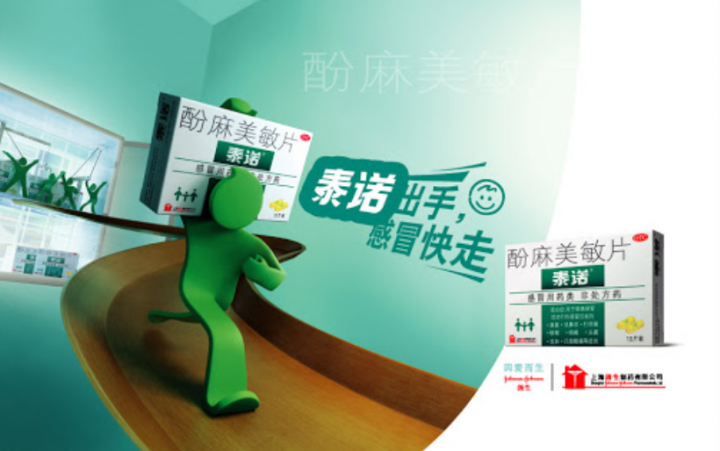

By Yolanda Lou
When you get a cold, the coughing, sneezing and other unpleasant symptoms often make taking medication a necessity. Although there are many traditional Chinese remedies, fast and effective Over the Counter (OTC) pills are increasingly popular in China. In this article we will analyze the Chinese names of three popular cold medicine brands to uncover common attributes called on to attract consumers. With many foreign and domestic brands now entering the Chinese OTC marketplace, developing a compelling Chinese name for medicinal products has become a legal, linguistic, and marketing necessity. As you will see, although these three names are appealing to cold sufferers, they do not greatly contribute to brand differentiation.

The name Tàinuò (泰诺), originally an American drug brand, is based on the English name “Tylenol”. The English name is derived from the chemical compound used in the medicine, N-acetyl-para-aminophenol. This technical form of naming may have proved awkward when translated into Chinese, so the name “Tàinuò” was chosen instead. The Chinese name has a similar pronunciation to the English name but also possesses specific and meaningful connotations in the Chinese language.
The upper part of the character tài (泰) is a fusion of the characters大 (dà), meaning large, and 廾(gǒng), a pictographic character representing two hands reaching up to the sky. The lower part is 水(shuǐ), or water. The whole character tài(泰) means calm, composed, peaceful, and safe in Chinese. It can be seen in the idiom Tàiránzìru (泰然自若), which means to keep one’s countenance, and guótài-mín’ān (国泰民安), indicating that a nation is prosperous and peaceful. Tài also means powerful, as in the name of the famous mountain “Tàishān”. Overall, this character simultaneously evokes feelings of peacefulness and power.
诺(nuò) is comprised of the characters 讠(言 yán) meaning words, and 若(ruò), which indicates pronunciation. Nuò means a promise, or to keep one’s word. In ancient times, nuò was used when government ministers signed a file to grant permission. When these characters are put together, Tàinuò reflects Tylenol’s promise to help people peacefully recover from their cold or flu with a powerful remedy. This Chinese name should appeal to consumers afflicted by cold symptoms.

Kuàikè (快克) is another popular cold medicine in China. The character kuài (快) has several meanings including fast, sharp, and happy. For instance, kuàisù (快速) means to do things quickly and efficiently. Kuàidāozhǎnluànmá (快刀斩乱麻) is a metaphor for the ability to solve complicated problems, and the word kuàilè (快乐) expresses the feelings of happiness and cheerfulness. Kè (克) here means “to overcome”. It is often used when describing someone getting through a difficulty or obstacle. When these two characters are used together they are easy for Chinese consumers to pronounce and remember. The name emphasizes overcoming difficulties quickly in order to feel happy, a message that will be welcomed by those suffering from symptoms of the common cold.

Chinese people are attracted by words and phrases that could bring them good luck. The name Kāngbìdé(康必得) is a phrase wishing people good health and safety. Similar to sayings like Gōngxífācái (恭喜发财), meaning “wish you to be as wealthy as you want”, or Wànshìrúyì(万事如意)meaning “wish you everything well”, Kāngbìdé also delivers a pleasant greeting to cold sufferers. Here, kāng(康)means health, bì(必) indicates “definitely will happen”, and dé(得) is to obtain or gain. The name “Kāngbìdé” calls on traditional Chinese culture by creating a lucky phrase or wish related to good health and safety. This could be part of the reason the brand has been popular among domestic brands for more than ten years.
From the above analysis we can see that Chinese cold medicine brand names call on attributes of health, happiness, and the power and speed of recovery. Interestingly, none of the medicine names indicate that they are for the common cold. The Chinese names are also different from English cold medicine brands which often use components from chemical ingredients without associated meanings behind them.
It also becomes apparent that since the Chinese cold medicines have very similar meanings, the brands themselves may not be differentiated by consumers. For a new or existing brand developing a Chinese name, this could be an opportunity to take a unique naming approach and stand out in the marketplace.
A Labbrand Group Company © 2005-2024 Labbrand All rights reserved
沪ICP备17001253号-3* Will be used in accordance with our Privacy Policy
To improve your experience, we use cookies to provide social media features, offer you content that targets your particular interests, and analyse the performance of our advertising campaigns. By clicking on “Accept” you consent to all cookies. You also have the option to click “Reject” to limit the use of certain types of cookies. Please be aware that rejecting cookies may affect your website browsing experience and limit the use of some personalised features.